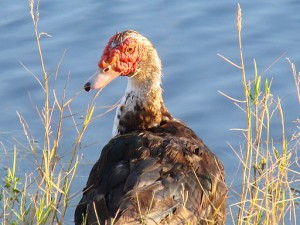The Muscovy duck is a bit of an oddball. They have an unusual appearance due to lumpy, heavy mottling around the eyes and beak. The male Muscovy can raise the mottled crest to attract females or warn other males and intruders. They don’t swim as much as other duck breeds, and they graze much like geese. However, these attributes, rather than being distractive, are actually some of the things that make them very appealing to homesteaders.
Muscovy ducks live for about seven years, although some have been known to live for up to twenty years in a protected farm environment. Since they are developed from wild flocks rather than domestic stock, they are hardier than many other duck breeds, making them a great choice for homesteaders.
 The Proof is in the Pan
The Proof is in the Pan
If you want the best of both worlds in regards to egg laying and meat production, then the Muscovy is the breed for you. Not only is this unusual looking duck friendly and delightful, they will give you rich duck eggs on a regular basis, and the meat is one of the most sought after duck meats around.
Muscovy ducks are an average weight and produce about the same amount of meat as your typical Pekin or Rouen. Male Muscovy ducks weigh between ten and fifteen pounds, while females weigh between five and seven pounds. The underdeveloped grease gland on the Muscovy ducks makes them easier to pluck than most ducks and geese. It also means their meat is smoother and less greasy. For those that like duck but not the greasy taste, the Muscovy is perfect—the meat has all the flavor and richness of duck meat without the greasiness.
Muscovy ducks do not lay the most eggs, but what they do lay are good quality eggs. (Khaki Campbell ducks are the queens of the duck egg, rivaling chickens for their production ability.) A single Muscovy hen will lay about 80 eggs per year, compared to a Khaki Campbell who will likely give you 365 or even more each year.
Pest Patrol
Like most ducks, having Muscovy ducks around has many benefits beyond what ends up on your table. Muscovy ducks eat bugs, grasses, weeds, and insects, so your property will be the envy of all your friends.
The Ultimate Guide To Self-Sufficient Living For Country, Urban, and Suburban Folks
Turning your flock of Muscovy out into the garden in the fall at the end of the growing season will get rid of any larvae in the ground that would hatch in the spring and make your gardening difficult. With your duck’s help, you can keep weeds and insects under control without the use of heavy pesticides.
Finally, Muscovy ducks are so efficient at finding any leftover grain spilled, food waste, or other goodies you might drop that they are also excellent forms of natural rodent control.
Feeding the Muscovy Duck
They are so efficient at finding and foraging for food that if left to their own devices, with enough room to roam you will probably not have to provide any extra feed at all. Simply making sure there is plenty of fresh water is all that is necessary in most cases.
If you have to keep your flock in a confined space with little or no forage, you will have to provide a good source of feed. Make sure it is not medicated feed, however; unlike many domestic fowl, Muscovy ducks may get quite ill from medicated feeds.
In the Barnyard
For homesteaders living in close areas where noisy ducks, geese, or chickens may be a nuisance, the Muscovy provides an extra allure: they are very quiet. Males make almost no noise at all, and females have a faint quack that is very pleasant and soothing.
Male Muscovy ducks can be quite aggressive, although they usually love their owners. They are very territorial, and fight very efficiently with strangers and competing males by using their claws and talons like a rooster rather than an average duck. Some people actually use their Muscovy as guard ducks!
Another interesting thing about the Muscovy is its ability to roost. Look up there in the trees, on the roof, fence or porch and you’ll likely find your heavily feathered friends. Muscovy ducks can fly quiet well, but what makes them a little more extraordinary is the gripping ability they posses. You won’t find Peking ducks roosting on a fence or in a tree, but you are likely to find their Muscovy counterparts doing just that.
Reproduction
Breeding your own flock of Muscovy ducks is easy as can be. They are a very natural breeder that require very little from their caretakers. Provide a cozy place for a nest and some freedom to be together, and you’ll have a good chance of up to three hatchings per year. Muscovy ducks lay good-sized clutches, and the females are excellent mothers.
Most hatcheries have Muscovy ducklings for sale that you can begin your flock with. While the breed is available wild, it is against the law to capture wild Muscovy ducks or disturb nests to take eggs for any reason.
When it comes to homestead ducks, the Muscovy just can’t be beat. Add a few to your flock, and you’ll understand why.
©2012 Off the Grid News
 Off The Grid News Better Ideas For Off The Grid Living
Off The Grid News Better Ideas For Off The Grid Living




